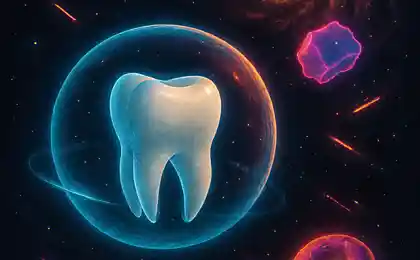629
Healthy sleep — 4 tips from astronauts
Six million nine hundred forty four thousand nine hundred seventy eight
Who understands the problems of sleep is best? Of course, astronauts. In this article we will explain how to solve the problem with the lack of sleep and regain a healthy sleep.
On duty they have. After all, most of the time they are cut off from the outside world, and, consequently, from the usual external signals that normally remind us what time of the day.
Astronauts working in orbit, watching sunrises and sunsets is more than once a day, so their circadian rhythms get off.
When you are in a tin can floating through the cold darkness of space, a lousy dream you provided, and it can have very unfortunate consequences.
Roughly speaking, due to lack of sleep you won't even notice that, for example, photograph the Earth, and the walls of the ship. Yes, sleep deprivation is a real problem.
Excerpt from "a Bold undertaking: Polar and space exploration. Life scientists in isolation":
... Cosmonaut Valentin Lebedev reported in his diary that often have made mistakes the next day after went to bed late; then he made fifty images of the Earth through a closed porthole before I realized my mistake.NASA began serious research.
3 great ideasNASA quickly realized a few things:
1) You're a slave to external signals
Without sunlight, darkness and other contextual signals, you may lose the ability to regulate sleep.
Excerpt from "a Bold undertaking: Polar and space exploration. Life scientists in isolation":
Environmental signals, for example, sunlight and its absence at night, as a rule, represent some of the reference points; losing them, people are beginning to sleep later and longer and longer awake every night.
2) Your body will not sustain activity 24 hours sudiv in the end your cycle of sleep and wakefulness could get completely out of control. If you don't pay attention to the changes, your circadian rhythm will begin to be 25,4 hours a day.
Excerpt from "a Bold undertaking: Polar and space exploration. Life scientists in isolation":
If the individual is in isolation from any temporary benchmarks, the cycle of sleep and wakefulness and rhythms of body temperature shifts every day to later hours. You go to bed later, disturbed circadian activity of the organism. Occurs Autonomous circadian rhythm. So the cycle of sleep and wakefulness of an individual may shift approximately 10 hours per week in the absence of the social reference points of time and environmental factors... In extreme cases, the execution cycle will continue.
3) You don't really assess the true quality sneezle you think that sleeping with the light on does not affect you, you are mistaken. It is likely that you will not even notice a decrease in the activity the next day.
Excerpt from "a Bold undertaking: Polar and space exploration. Life scientists in isolation":
... Many people mistakenly believe that all people adapt to regular sounds for them, and they are not affected by noise during sleep. In fact, the sleep of most people is disturbed the usual sounds. Some don't even Wake up and realize what is happening at the time, as the quality of their sleep decreases.This information is a great value than you think. Why?
We're all astronauts nowAs John Durant points out in his fascinating new book "the Paleolithic Era: Ancient knowledge about health," thanks to modern technology currently compare ordinary people with the astronauts is appropriate.
Excerpt from "the Paleolithic Era: Ancient knowledge about health":
Today we are completely dependent on artificial signals of modern life. Now the word "light" we mean not the sun, and artificial lighting, the light from TV screens and computer monitors. The temperature does not depend on the cycle of cooling at night and warming during the day. It is supported by the thermostat. As for communication, we live "in isolation", we keep contacts with real people to a minimum, but at any time of the day or night, you can chat online, watch TV, listen to the radio. Now that our circadian rhythms have been utter confusion, we try to regain control with the help of stimulants (caffeine, nicotine) and depressants (alcohol, sleeping pills). Is it any wonder that one-third of Americans are chronically sleep deprived?You might think that all this does not concern you, or at least not too affect you.
You are wrong. Remember point 3.
The study, which involved ordinary people, showed the same results. After 2 weeks of 6 hours of sleep I could compare you with a person in a condition of alcoholic intoxication:
... At the end of the second week the subjects were weakened just as those in another study of Dinges was deprived of sleep for 24 hours straight. They were compared with alcohol intoxication.But what chronically nedosypayuschie talked about his health? "I don't notice anything unusual."
Even after 14 days of study they argued that sleepiness does not affect them. In fact, their activity has decreased. In other words, people who sleep not enough not to realise how they need healthy sleep. We are not as invulnerable as you think.
So if your activity has decreased due to sleep problems, you might not be aware about it. However, this problem exists.
So what kind of answers we offers NASA?
What should you do?
In the past I studied the results of studies on sleep and documented her experiments. Now let's add what we know about the astronauts.
Given that you probably won't Wake rocket engine Skylab or the sound of the expanding and Contracting of your ship's hull, I cut the recommendations to four points:
Excerpt from "the Paleolithic Era: Ancient knowledge about health":
It is useful to set the alarm clock for not waking up and order to go to sleep. Wind the clock so that it worked for an hour before bedtime. When it will ring, complete any work on the computer, turn off the TV, turn out the unnecessary lights and start to prepare for the new day.This method will not allow you to cheat yourself and will give you the opportunity to Wake up naturally. (Even if "naturally" occurs on the surface of the moon.) published
P. S. And remember, only by changing their consumption — together we change the world! ©
Source: megamozg.ru/company/mbaconsult/blog/15502/
Who understands the problems of sleep is best? Of course, astronauts. In this article we will explain how to solve the problem with the lack of sleep and regain a healthy sleep.
On duty they have. After all, most of the time they are cut off from the outside world, and, consequently, from the usual external signals that normally remind us what time of the day.
Astronauts working in orbit, watching sunrises and sunsets is more than once a day, so their circadian rhythms get off.
When you are in a tin can floating through the cold darkness of space, a lousy dream you provided, and it can have very unfortunate consequences.
Roughly speaking, due to lack of sleep you won't even notice that, for example, photograph the Earth, and the walls of the ship. Yes, sleep deprivation is a real problem.
Excerpt from "a Bold undertaking: Polar and space exploration. Life scientists in isolation":
... Cosmonaut Valentin Lebedev reported in his diary that often have made mistakes the next day after went to bed late; then he made fifty images of the Earth through a closed porthole before I realized my mistake.NASA began serious research.
3 great ideasNASA quickly realized a few things:
1) You're a slave to external signals
Without sunlight, darkness and other contextual signals, you may lose the ability to regulate sleep.
Excerpt from "a Bold undertaking: Polar and space exploration. Life scientists in isolation":
Environmental signals, for example, sunlight and its absence at night, as a rule, represent some of the reference points; losing them, people are beginning to sleep later and longer and longer awake every night.
2) Your body will not sustain activity 24 hours sudiv in the end your cycle of sleep and wakefulness could get completely out of control. If you don't pay attention to the changes, your circadian rhythm will begin to be 25,4 hours a day.
Excerpt from "a Bold undertaking: Polar and space exploration. Life scientists in isolation":
If the individual is in isolation from any temporary benchmarks, the cycle of sleep and wakefulness and rhythms of body temperature shifts every day to later hours. You go to bed later, disturbed circadian activity of the organism. Occurs Autonomous circadian rhythm. So the cycle of sleep and wakefulness of an individual may shift approximately 10 hours per week in the absence of the social reference points of time and environmental factors... In extreme cases, the execution cycle will continue.
3) You don't really assess the true quality sneezle you think that sleeping with the light on does not affect you, you are mistaken. It is likely that you will not even notice a decrease in the activity the next day.
Excerpt from "a Bold undertaking: Polar and space exploration. Life scientists in isolation":
... Many people mistakenly believe that all people adapt to regular sounds for them, and they are not affected by noise during sleep. In fact, the sleep of most people is disturbed the usual sounds. Some don't even Wake up and realize what is happening at the time, as the quality of their sleep decreases.This information is a great value than you think. Why?
We're all astronauts nowAs John Durant points out in his fascinating new book "the Paleolithic Era: Ancient knowledge about health," thanks to modern technology currently compare ordinary people with the astronauts is appropriate.
Excerpt from "the Paleolithic Era: Ancient knowledge about health":
Today we are completely dependent on artificial signals of modern life. Now the word "light" we mean not the sun, and artificial lighting, the light from TV screens and computer monitors. The temperature does not depend on the cycle of cooling at night and warming during the day. It is supported by the thermostat. As for communication, we live "in isolation", we keep contacts with real people to a minimum, but at any time of the day or night, you can chat online, watch TV, listen to the radio. Now that our circadian rhythms have been utter confusion, we try to regain control with the help of stimulants (caffeine, nicotine) and depressants (alcohol, sleeping pills). Is it any wonder that one-third of Americans are chronically sleep deprived?You might think that all this does not concern you, or at least not too affect you.
You are wrong. Remember point 3.
The study, which involved ordinary people, showed the same results. After 2 weeks of 6 hours of sleep I could compare you with a person in a condition of alcoholic intoxication:
... At the end of the second week the subjects were weakened just as those in another study of Dinges was deprived of sleep for 24 hours straight. They were compared with alcohol intoxication.But what chronically nedosypayuschie talked about his health? "I don't notice anything unusual."
Even after 14 days of study they argued that sleepiness does not affect them. In fact, their activity has decreased. In other words, people who sleep not enough not to realise how they need healthy sleep. We are not as invulnerable as you think.
So if your activity has decreased due to sleep problems, you might not be aware about it. However, this problem exists.
So what kind of answers we offers NASA?
What should you do?
In the past I studied the results of studies on sleep and documented her experiments. Now let's add what we know about the astronauts.
Given that you probably won't Wake rocket engine Skylab or the sound of the expanding and Contracting of your ship's hull, I cut the recommendations to four points:
- Make yourself a schedule, even on weekends. Remember the problem of the Autonomous circadian rhythm. If you do not follow the mode, the sleep phase starts to lag.
- An hour before bedtime to relax. Yes, you have a lot of work. But your time is not more valuable than the time of the astronaut. So select the same hour for the rest.
- Let the contrast between day and night will become more clear. Well, if this morning in natural sunlight. Dim the lights at night. Turn off electrical devices before going to sleep. You can also use different applications for convenience, for example f.lux.
- Let your bedroom be dark, cool and quiet. Even if you believe that "the light doesn't bother you" or "noise is not so strong," all this may lead to reduced quality of sleep.
Excerpt from "the Paleolithic Era: Ancient knowledge about health":
It is useful to set the alarm clock for not waking up and order to go to sleep. Wind the clock so that it worked for an hour before bedtime. When it will ring, complete any work on the computer, turn off the TV, turn out the unnecessary lights and start to prepare for the new day.This method will not allow you to cheat yourself and will give you the opportunity to Wake up naturally. (Even if "naturally" occurs on the surface of the moon.) published
P. S. And remember, only by changing their consumption — together we change the world! ©
Source: megamozg.ru/company/mbaconsult/blog/15502/






















